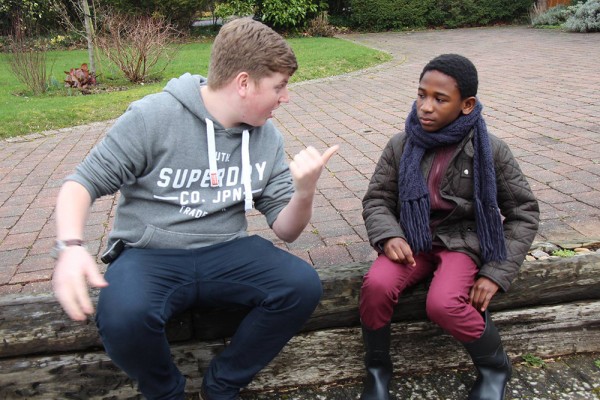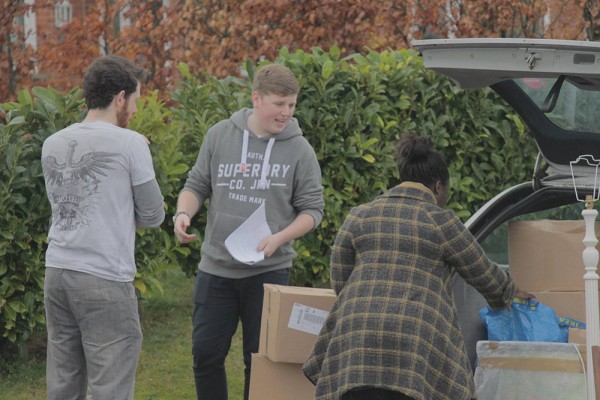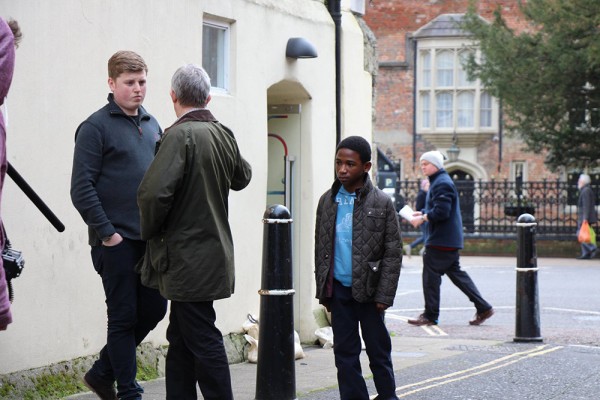Making an amazing film is not a prerequisite for getting noticed in the world of microbudget filmmaking. Benjamin Wick’s film, Slide Down South is one such film that deserves recognition because it succeeds where films with a Hollywood budget fail. It forces us not only to look introspectively at our own rash judgements, but also at societal perceptions of age, relationships, loneliness and love in general.
Wick’s has a provocative filmmaking repertoire that includes: Insanis — the story of a boy awoken by clones of himself; Filmaphilliacs – a documentary following the lives of those who suffer with a personality disorder which makes the sufferer believe themselves to be a character from film or television; and Stargazer — a comedic look at the life of an introspective call center worker.
Slide Down South focuses on the life of John, a recluse, who develops a friendship with Ruben. Ruben, the new child on the street needs help settling in, cash-strapped mum Alanna welcomes John’s attentions towards her son and accepts his offers of babysitting. Her partner Nathan is less understanding, he reacts aggressively towards the idea of an elderly man alone with his child. Slide Down South is a film about connection and begs the question: will age define the relationship between these two outcasts, indeed are they destined to be torn apart by societies perceptions of what is acceptable in terms of relationships?
I had a chance to chat to Wicks about film inspiration, working with a tight budget, casting, scripting, and other technical hurdles as well as what’s coming next for the talented director.
MFM: Hey Ben! Thanks for taking the time to talk to me.
Having watched Slide Down South, what initially struck me was it’s hard-hitting nature. I attribute that to the contemporary themes you explore as well as the relative normality of the setting, the feeling that this was happening ‘just around the corner’ in ‘safe’ suburbia. As a film-maker do you find yourself seeking inspiration from topical events or other creators and, if so, did any specific ones impact Slide Down South?
BW: I hate the idea of becoming a one trick pony and trying to emulate just one technique from a favourite director, I always look for different inspiration when starting a new project. In terms of Slide Down South, I really wanted to create something quite ‘true’ to everyday life, something that I could really sink my teeth into writing. In that sense, inspiration came mainly from directorial influences. Both Steve McQueen (Shame, 12 Years a Slave and Hunger) and David Fincher ( Fight Club, Seven and House of Cards) had such powerful films, in terms of story and performance, and that was certainly something I was eager to re-create. I loved the idea of using wide shots, basically leaving the camera running and letting a scene play out naturally. Something that I had picked up from McQueen in both 12 Years and Hunger. Slide Down South is about an elderly man, John, who lives alone and forms an unlikely friendship with a family member next door. I used the wide shots to play on the idea of loneliness and how time passes slowly.
MFM: You said your inspiration changes from film to film, talk us through some of your other work and its inspirations?
MFM: All your films offer such varied vantage points into human nature. Stylistically how would you describe SDS’s genre and is this a genre you often find yourself drawn to?BW: Away from SDS, my second film of 2013 was Stargazer. In this, I took massive influence from Ricky Gervais and Stephen Merchant, especially when creating the character of Colin. So, as iI said, I try to find new inspiration all the time. Films would be boring if you just tried to emulate one influence in every film! I would like to add that I despise writing on my own. If I were to give one tip to any young and aspiring film writers/directors/producers it would be to find a writing partner. I am fortunate to have one of my best friends, Chris Lindsay, as my writing partner (Co-wrote Aries, Filmaphiliacs, Colossus and Slide Down South). We both have similar creative ideas, however, we also have completely different views on others. That’s what makes the ideal partnership. I have also been lucky to find another, Ryan Fawkes, who co-wrote Stargazer with me.
BW: I would say that Slide Down South definitely fits into the ‘drama’ genre. I certainly find writing drama the most enjoyable. You can really allow for more movement and non-dialogue scenes in drama; it just adds another dimension to the tension and/or emotion. I thrive for creating an emotional response from the audience; the ability to be able to change the way the viewer feels about a character is amazing. I suppose in some ways it’s my way of getting to play God! Not only that, but writing comedy is bloody hard! It’s easy to write what you personally find funny, but trying to write something that Joe Blow finds funny is a whole new ball game. For me, drama allows me to create three dimensional characters and more emotionally engaging scenes.
MFM: And in terms of style and theme?
BW: In terms of style and theme , I try not to write with the same theme and style in mind each time. It would make my films boring and repetitive and I am always looking for new ways to make stories engaging.
MFM: You certainly seem to be driven by making your films as engaging as possible! Does that translate to how you distribute your films?
BW: Distribution was managed solely through social media. Although we have perhaps become a world of social media robots, I can’t praise it enough for acting as a platform to send my film out to as many people as possible. We are also in the process of applying to both national and international festivals.
MFM: Sticking with the topic of your audience, how much of an impact did they have on SDS as you were creating it?
BW: I always write with the audience in mind, I am constantly thinking of ways to provoke an emotional response; however, I don’t write films worrying about causing upset or offence to anyone, nor to make it social media friendly. If you are doing that, then it starts to block your own creativity, in my opinion. Write about what you want to write about! Don’t worry about what others might think! As I mentioned earlier, whenever I write a script, I am constantly thinking of different ways to provoke an emotional response from the viewer. So, yes, I am constantly thinking about them.
MFM: SDS explores issues that are certainly relevant to most of us in society today. With the emergence of revelations concerning Jimmy Saville, Rolf Harris and Ian Watkins, adult relationships with children are increasingly under scrutiny. How did you wish to make a comment about the world we live in through your film?
MFM: The characters are so complex, writing so touching and shots so poignant in SDS. Can you talk us through how you got to that stage?BW: When I started writing SDS with Chris, we both wanted to make some kind of comment on the world we live in. We wanted to look at the blatant scare-mongering tactics that are seen throughout tabloids when it comes to the idea of someone being a pedophile. It’s like you see a completely innocent elderly man walking in the park and without a doubt most people will question why he is doing that. I’ve seen a man walking his dog in a park before and watched a father pick up his son, turn to me and say ‘Why is he hanging around in a park? Makes me sick, they should be locked up’. I hate jumping on some kind of bandwagon and I certainly do not wish to spout my gospel to people!
A lot of people come to me and ask whether [the character of] John is a pedophile. The answer is no. In fact, thinking that only proves my point more so that people have misinterpretations. Of course, I wanted to create some doubt in people’s minds and play on that whole idea but, foremost, he is not a pedophile. At no point in the film are there any suggestions of John being sexually attracted to Ruben. It’s more a story about how an elderly man strives to be the paternal figure he missed out on.
We created the character of Nathan to act as the voice of society, questioning why an elderly man wants to hang around with a young child. In fact, we wanted to highlight more of John’s aggressive side and sheer determination to become a grandfather figure to Ruben. Although not explicitly told, John had a grandson who died, this is why he tries to find friendship with Ruben.
Slide Down South is about connection, love and friendship, especially those friendships that aren’t so common and are completely frowned upon by society.
BW: As with all the films I make, I start with getting a script locked down and ready to shoot. From that, I then went to cast. Being a student production, finding a solid cast can be hard to come by, it’s a shame with the stigma that is attached with student filmmaking. (The stigma being that all student productions are unprofessional and useless). I used a site, starnow.com, to ask for actors to work for expenses only and I cannot praise that site enough. I managed to find three of the central characters, (Alastair Greener, Temi Oduba and Shane Noone) who not only worked for expenses, but gave remarkable and incredible performances. Ruben (Seyi-Paul) was found at a local school in Winchester. This was achieved through a friend and now business partner, Sarah Culverhouse, who has previously worked as a child casting agent. We sent letters around to all drama departments asking to hold auditions. Again, I can’t thank the school enough for allowing a student production to do that.
Next job is to find a talented crew. We only had a budget of £600 so finding crew to work again for free, but for expenses seemed to work. I was blessed with a 100% committed and very talented crew. Chris Lindsay, my co-writer, acted as Director of Photography. That meant our vision was fully achieved through both performance and visuals. Finding an organised and committed producer and 1st A.D is also vital. I cannot speak highly enough of Flora Wilson (Producer) and Sarah Culverhouse (1st A.D) who helped structure and plan the entire logistical side of the film, a special mention must also go to Jack Barlow, Jonny King and Robin Yonge who were absolutely amazing and could not have achieved my vision without them.
A lot of friends I know who make films like to shoot sporadically, here and there whenever they can. I tend to stick with the formula of a 3-10 day straight shoot, that allows me to be fully focused on the project at hand.
MFM: With a budget of £600 and a limited time to film you must have come across some struggles! What sorts of technical hurdles did you encounter along the way? Any advice for other filmmakers in that situation?
BW: Trying to decide on what camera to use and how much we could afford to spend was a big technical hurdle. It’s a shame that so many rental companies charge such an extortionate amount as a holding deposit, an amount that most small-budget productions won’t have to hand. After a lot of digging we found a friend who has a 5d Mark III to lend. I would highly recommend the camera to anyone who wants to shoot with a production with exceptionally high production values. It’s light, durable and doesn’t become too intrusive during takes. Bigger cameras can be quite off-putting for actors!
MFM: You must be eager to consolidate on the success SDS! What are your future plans? Do you have any projects in the pipeline?
BW: A well-earned break! I wish! I am currently in the process of setting up my own production company, Belmont Media, with Sarah Culverhouse, mainly dealing in short film, promotional & corporate videography and documentary. We are currently working on videos for both The NHS and British Army , which is all rather exciting. Away from promotional work, I am due to direct a short, Humankind (written by Sarah Culverhouse), which is being made for the Winchester Film Festival. I am currently writing my next script, ‘Homeless’ (working title), due to be filmed in Oct/Nov and released in Feb/March 2015.
MFM: Thanks you for taking the time to talk to us Ben, and I gather you’re still keen to collaborate with new people!
Feel free to get to touch base with Ben. Check out the rest of Ben’s work at the Ben Wicks YouTube Page. The trailer for the film is embedded below!



